|
|
|
Sort Order |
|
|
|
Items / Page
|
|
|
|
|
|
|
| Srl | Item |
| 1 |
ID:
131909
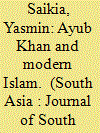

|
|
|
|
|
| Publication |
2014.
|
| Summary/Abstract |
Pakistan is viewed today as a haven for fundamentalist Islamists. This essay probes the genealogy of Pakistan's Islamisation by focusing on the rule of President Ayub Khan (1958-69) and extends to the war of 1971 and the dismembering of Pakistan during Yahya Khan's presidency. I trace Ayub Khan's project of 'modernising Islam and the nation' by probing three sites: the transformation of the Pakistani military into a jihadic army; the re-writing of history to craft an Islamic identity; and the reformation of East Pakistani Bengalis to make them 'good Muslim subjects'. Ayub Khan's experiment was a failure, leading to the violent dismembering of the country in 1971, yet an ethical imaginaire of renewing the commitment to creating a humanistic moral community continues to be an ongoing quest in Pakistan, as reflected in my investigations of the oral testimonies of war veterans. Fulfilling these ethical concerns requires critical evaluation of the roots of Islamisation in Pakistan, beginning from the period of Ayub Khan's presidency.
|
|
|
|
|
|
|
|
|
|
|
|
|
|
|
|
| 2 |
ID:
148603
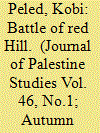

|
|
|
|
|
| Summary/Abstract |
This article explores the relations between inhabitants of the Upper Galilee village of Mi'ilya and soldiers of the Arab Salvation Army (ASA) in the months leading up to the conquest of the village in October 1948. Using interviews conducted in Arabic with surviving elders from Mi'ilya as well as contemporaneous Hebrew documents preserved in the archives of the Israeli army, the article aims to construct an integrated historical narrative of events. Throwing light on little-known figures of the ASA, the study uncovers the complex web of relationships that emerged in the day-to-day interactions of the ASA volunteers with the Palestinian villagers they were sent to defend. Particular emphasis is placed on the battle of Red Hill, now mostly forgotten, which took place almost three weeks before the fall of the village, mobilizing ASA troops, members of the local militia, and residents of Mi'liya in a joint effort to fend off encroaching Israeli forces.
|
|
|
|
|
|
|
|
|
|
|
|
|
|
|
|
| 3 |
ID:
166633
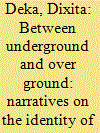

|
|
|
|
|
| Summary/Abstract |
The Assam Movement (1979–1985) has been a turning point in the politics of Assam in India that has raised the question of identity and at the same time triggered the struggle to self-determination by the insurgent organization United Liberation Front of Asom (ULFA). This paper aims to take identity as the point of departure to mark the transition of women’s role from the Assam Movement into their underground roles in ULFA. In such narratives of hero-making and patriotism, under-representation of women’s strategic involvement and self-sacrifices in the insurgent outfit often leaves the lives of the women members misrepresented and fails to highlight the in-betweens of life and death. This paper pushes the idea of identity assertion in Northeast India beyond citizenship and questions the way women’s presence in the insurgent organization gets narrated, documented, and established. Oral histories are crucial sources of data for this study.
|
|
|
|
|
|
|
|
|
|
|
|
|
|
|
|
| 4 |
ID:
172222
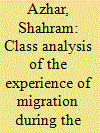

|
|
|
|
|
| Summary/Abstract |
Abstract
The paper conducts a class analysis of the human experience of migration during the Partition of India using a dataset constructed from 1,000 recently published oral narratives by migrants from across the Indian subcontinent. The dataset collates and maps information for four key variables: (1) origins and destinations of migrants; (2) class backgrounds of migrants; (3) modes of transport used during migration; and (4) experiences of direct or indirect violence. Satellite mapping and network analysis are used to develop an empirically grounded cartographic understanding of the relationships between these variables. The results point to a sharply hierarchical story. Differences in class background not only closely correlate with differences in mode of transport and choice of destination, but also with the timing and intensity of an episode of violence. Most importantly, migrants’ experiences show greater similarity within class background and regionality than within a religious group. Thus, not only are discussions based on the conceptual binary of religion unable to account for the large variations in the experiential aspects of Partition, they are also unable to connect these experiences to the broader social structure of the colonial polity in the Indian subcontinent. By reinstating class as an analytical category, this paper seeks to improve our understanding of the humanitarian costs and consequences of the Partition of 1947.
|
|
|
|
|
|
|
|
|
|
|
|
|
|
|
|
| 5 |
ID:
115816
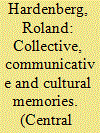

|
|
|
|
|
| Publication |
2012.
|
| Summary/Abstract |
In recent years several historical publications have appeared in Kyrgyzstan which are far from homogeneous in terms of style, form and content. In this article, two very different local histories written by Kyrgyz authors from the same village are analysed and compared. The first author is a former kolkhoz president who produced two books that basically cover the time from the end of the nineteenth to the end of the twentieth century. His work is strongly (auto)biographical and focuses on individual achievements and personal experiences. The second author is a mathematician who wrote two books about the history of his own descent category (uruu). His work combines oral history (sanjyra) with written sources. The two authors create very different images of 'esteemed people' (ardaktuu adamdar), yet they exhibit a common interest in producing a narrative that links the deeds of one's own people (family or descent group) with the history of particular places (pastures, villages or regions). Taking up these observations, the author argues that local histories relate to different types of memory and are far from uniform with regard to their composition, sources, methods and narrative strategies. Yet, despite their diversity, the newly developed genres of 'written collective memory' provide the idea of social continuity by stressing connections between past and present, and between people, land and morality. This may indeed be one reason why collective memories, which were suppressed for many decades, have become so popular in times of rapid social transformation.
|
|
|
|
|
|
|
|
|
|
|
|
|
|
|
|
| 6 |
ID:
172206
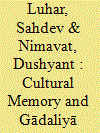

|
|
|
|
|
| Summary/Abstract |
Focused on the cultural memory of the Gādaliya Luhār community in Gujarat, this article discusses ways in which oral traditions and cultural memory among nomadic groups in India shape the identity of a community under the challenge of cultural amnesia. The Gādaliyā Luhārs claim Rājpūt status and close association with the kings of the Mewar region of Rajasthan, but experienced double cultural amnesia, first under the Mughals and later in the British Empire, which affected their identity. The article seeks to assess the authenticity of the community’s assertions of cultural memory in the light of some historical documents and asks to what extent cultural memory through oral narratives can be taken as valid evidence for understanding the cultural identity of a specific community.
|
|
|
|
|
|
|
|
|
|
|
|
|
|
|
|
| 7 |
ID:
163819
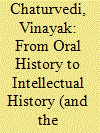

|
|
|
|
|
| Summary/Abstract |
This paper provides an interpretation of the Bengali Intellectuals Oral History Project as a new archive for studying the intellectual history of South Asia. It explains that an important outcome of the nexus between oral history and intellectual history is the construction of an ‘unintended autobiography’ of each subject interviewed in the project. By considering the centrality of autobiography, the paper offers insights into rethinking the methodological approaches to writing the intellectual history of South Asia. Finally, it provides a reading of Partha Chatterjee’s seminal writings, along with his oral history, as a way to consider the convergence of autobiography with political thought.
|
|
|
|
|
|
|
|
|
|
|
|
|
|
|
|
| 8 |
ID:
192302
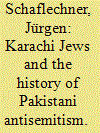

|
|
|
|
|
| Summary/Abstract |
With the help of multi-sited ethnography in Israel and Pakistan, this paper looks at the history of antisemitism in the Islamic Republic of Pakistan. I show that while antisemitism is widespread in parts of Pakistani society today, it was not the reason why most of Karachi’s Jews left the country in the 1960s or the 1970s. In the paper, I explore possible explanations for the rise of antisemitism in parts of Pakistan’s society.
|
|
|
|
|
|
|
|
|
|
|
|
|
|
|
|
| 9 |
ID:
133832


|
|
|
|
|
| Publication |
2014.
|
| Summary/Abstract |
From 2010 to 2012 a diverse group of young people participated in an oral history theatre project, Chronicles, which aimed to support them to claim a personally meaningful Australian identity. Oral history theatre was used to facilitate a process whereby the young people were able to reconnect with their personal family histories, encounter Aboriginal young people and stories, and together interview Aboriginal Elders. Through this process, they could develop new understandings of their own social identities, and meanings of and possibilities for belonging. 'Centring diverse lives, decentring whiteness' and 'a different starting point: Aboriginal ways of knowing', were the two key outcomes that we report on. Bringing people from diverse cultural and social backgrounds together to share stories of history, culture and identity, offers a unique vantage point from which to rupture dominant narratives about belonging/non-belonging and show up whiteness, and together forge a new Australian identity reflective of everyday multiculturalism.
|
|
|
|
|
|
|
|
|
|
|
|
|
|
|
|
| 10 |
ID:
157705
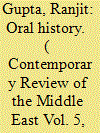

|
|
|
|
|
| Summary/Abstract |
Shri Hamid Ansari, former Vice President of India, Shri Chenmaya R. Gharekhan, former Prime Minister’s Special Envoy for West Asia, the Deputy Director General of IDSA, my fellow panelist Professor S. D. Muni, the author Professor Kumaraswamy, friends, ladies, and gentlemen.
|
|
|
|
|
|
|
|
|
|
|
|
|
|
|
|
| 11 |
ID:
124887
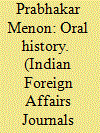

|
|
|
|
|
| Publication |
2013.
|
| Summary/Abstract |
Ambassador Prabhakar Menon served as advisor on foreign affairs to Prime Minister Shri P. V. Narasimha Rao when he was privy, on numerous occasions, to high-level interaction between our Prime Minister and his counterparts around the world. He had also served earlier as Director of the Foreign Secretary's office where again he was an eyewitness to some significant developments. In this conversation with the Journal, he recounts some of the events that shaped India's Foreign Policy postures - as he saw from close quarters (as the proverbial 'fly on the wall') during those two tenures.
|
|
|
|
|
|
|
|
|
|
|
|
|
|
|
|
| 12 |
ID:
117926
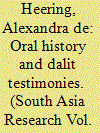

|
|
|
|
|
| Publication |
2013.
|
| Summary/Abstract |
The development of dalit literature and history plays a vital part in the effort of dalit communities to (re)gain recognition in Indian society. Victims of multiform discrimination in the name of caste, dalits have used these areas of self-knowledge to assert themselves culturally and socially. Indian society and mainstream intellectuals continue, however, to deny the value and legitimacy of dalit historical and literary productions. There is a tendency to believe that dalits should be kept out of the mainstream and effectively silenced. Therefore, testifying through writings or oral narratives still requires courage and determination. It certainly seems to be a demanding ordeal for those paving the way for dalit expression. This article, based on oral history fieldwork conducted among dalit (Cakkiliyar) communities in Tamil Nadu, as well as on written testimonies, highlights factors preventing dalits from exercising freedom of speech and also discusses some reasons why dalits do decide to speak.
|
|
|
|
|
|
|
|
|
|
|
|
|
|
|
|
| 13 |
ID:
149788
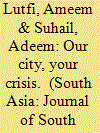

|
|
|
|
|
| Summary/Abstract |
This essay approaches the Partition of British India through the perspective of the Baloch inhabitants of Karachi, who locate the city at the centre of diverse political geographies and cultural lineages. We specifically look at the testimony of the residents of Karachi's historic neighbourhoods of Qiyamahsari and Lyari. Their narratives demonstrate how Partition spelled the end of certain forms of socio-political life in the city, while reaffirming others. Together, these narratives help re-conceptualise Partition as a temporally and spatially dilated series of migrations and transformations, rather than as an event unproblematically tethered to the space and time of nation-states.
|
|
|
|
|
|
|
|
|
|
|
|
|
|
|
|
| 14 |
ID:
109006
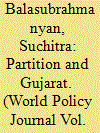

|
|
|
|
|
| Publication |
2011.
|
| Summary/Abstract |
Compared to Punjab and Bengal, Gujarat's experiences of the Partition of India in 1947 remain curiously under-researched even though the state has a long border with Pakistan and over a million people migrated to Gujarat, mostly from neighbouring Sindh. This paper seeks to fill this lacuna in Partition scholarship by examining the experiences of two Hindu groups, Sindhis and Gujarati Dalits, who left Sindh to settle in Ahmedabad. Drawing on the oral testimonies of migrants, the paper shows that while the official logic of Partition might have been predicated on irreconcilable religious identities, the actual experience of Partition brought into play multiple identities arising from regional, caste and community affiliations as well as gender, which migrants drew on in order to cope with the upheaval caused by Partition.
|
|
|
|
|
|
|
|
|
|
|
|
|
|
|
|
| 15 |
ID:
139446
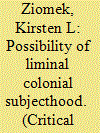

|
|
|
|
|
| Summary/Abstract |
This article examines whether writing histories of colonial subjects is possible. Traditional colonial histories subsume the colonial subject's individual history under a larger narrative of subjugation, which often does not allow room for people to exist outside the dichotomized role of collaborator/resister. This approach has left a gap in the scholarship for histories of colonial subjects whose lives do not easily fit either category. This article addresses this gap by detailing the life of Yayutz Bleyh, an Atayal woman who became one of the most important participants in the Japanese colonial administration of Aboriginal Affairs in Taiwan. For over six years, the author gathered fragmented pieces of information regarding Yayutz from a multitude of sources – visuals, as well as oral and written materials from inside and outside the colonial archive – in order to sketch the contours of an extraordinary woman and her life. Through the process of filtering these disparate sources, it was the silences regarding certain issues and the discrepancies that emerged among sources that proved to be the most revealing about Yayutz as someone who straddled both the world of the colonizer and the colonized.
|
|
|
|
|
|
|
|
|
|
|
|
|
|
|
|
| 16 |
ID:
152008
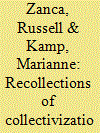

|
|
|
|
|
| Summary/Abstract |
Collectivization of agriculture in Uzbekistan demanded the efforts of many local agitators who called on Uzbek dehqons to join kolkhozes, and who stimulated a local version of class warfare. In oral history interviews with those who experienced mass collectivization’s first moments, we find both the brutality of change imposed from above and a social transformation led by local Uzbek activists. We argue that Uzbek agitators allowed many dehqons to identify with this project to change rural land ownership, and that their offers of tangible benefits, such as advance payments for cotton crops and distribution of food, provided strong incentives for joining. Class rhetoric was important as activists divided the poor from the kulak and used threats of dekulakization, as well as incentives, to promote rapid collectivization.
|
|
|
|
|
|
|
|
|
|
|
|
|
|
|
|
| 17 |
ID:
139179
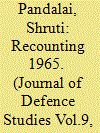

|
|
|
|
|
| Summary/Abstract |
‘Stalemate’, ‘futile’, ‘forgotten’—the descriptions of the 1965 War between India and Pakistan often do injustice to its profound Impact on the history of the Indian subcontinent. It was a war that altered the fates of India and Pakistan both politically and militarily, and officially began the new great game for Asia. For India, it was a test of leadership post Nehru and banishing the demons of 1962. For Pakistan, it was about Kashmir and testing India, playing roulette with the superpowers, and sealing its friendship with China. Fifty years on, this article attempts to understand the myriad motivations of this war and focuses on the political conversations and intense diplomatic manoeuvring that New Delhi undertook to emerge on the right side of history. Approached from an oral history perspective, conversations have been pieced both from India and Pakistan, to study the flash-points of a war, often underscored in its importance in the annals of history.
|
|
|
|
|
|
|
|
|
|
|
|
|
|
|
|
| 18 |
ID:
107544
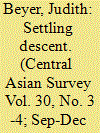

|
|
|
|
|
| Publication |
2011.
|
| Summary/Abstract |
This article explores how the inhabitants of two villages in northern Kyrgyzstan relate to one another and to their environment in terms of both place and genealogy. By performing relatedness, people make claims upon a physical landscape, while their relationships are simultaneously shaped by perceptions of the particular place they live in. The term 'settling descent' evokes this dialectic, in which people 'settle' descent in a literal sense in rituals, statues, objects and the stories they tell about the past and the present. The often-repeated academic opposition of 'identity through kinship' vs. 'identity through locality' is resolved by showing how both are aspects of the same historical process. The paper draws on oral histories of key informants, ethnographic case studies and classical as well as recent literature on kinship, place, post-socialism and the anthropology of Central Asia.
|
|
|
|
|
|
|
|
|
|
|
|
|
|
|
|
| 19 |
ID:
132958
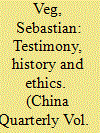

|
|
|
|
|
| Publication |
2014.
|
| Summary/Abstract |
The memory of the Anti-Rightist Movement has long been a blind spot in Chinese debates, with historiography limited to elite politics and little engagement with the repercussions of the movement at grassroots level. However, the publication of Yang Xianhui's 2003 book, Chronicles of Jiabiangou, marked a turning point. Based on extensive oral history interviews, Yang's book makes a substantive connection between the Anti-Rightist Movement and the establishment of dedicated laojiao camps such as Jiabiangou in Gansu province. Documenting what he claims was a policy of dehumanization, he suggests that intellectuals were far from the only victims of a movement characterized by its extra-legal procedures. Ordinary people were often drawn into it and were more able than intellectuals to resist the legitimizing discourse of loyalty to the Party to which many intellectuals continued to cling. For Yang, the testimonies of the Rightist victims in Jiabiangou provide a fruitful field in which to investigate the breakdown of elementary social trust in society during the Anti-Rightist Movement. Situated ambiguously between oral history and literary intervention, Yang's work has, together with other recent publications such as Tombstone, contributed to reopening the debate on Maoism in Chinese society today
|
|
|
|
|
|
|
|
|
|
|
|
|
|
|
|
| 20 |
ID:
163818
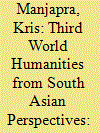

|
|
|
|
|
| Summary/Abstract |
This essay is a thematic and methodological introduction to the Bengali Intellectuals Oral History Project. This interpretive oral history collection reckons with and complicates the over-representation of Bengalis in the study of South Asian intellectual history. As editors, we propose a new framework to study intellectual life in the period of decolonisation—the study of Third World humanities from South Asian perspectives. We situate West Bengal and Bangladesh as important, but obviously not exclusive, vantage points from which to explore formations of Third World thought from the 1940s to the 1980s. Methods in oral history collecting and curation help us to comprehend the intelligibility of Third World humanities expressed from regionally grounded, and diasporically mobile, South Asian perspectives.
|
|
|
|
|
|
|
|
|
|
|
|
|
|
|
|
|
|
|
|
|